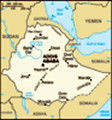Advertisement
Published: June 27th 2009
The Rural Areas
Traveling to the rural area was literally a step back in time. It is a simple, difficult and fulfilling life people lead. Women, men and children spends their days pretty much the same everyday. They get up and go early to gathering water for the day to tend to their farm, animals and families. The earlier you get to the watering hole the less muddy it is from everyone else who goes there. Sometimes this walk might be 2 hours each way, returning with heavy containers of water. So it was 5:30am and the roads are full of people herding their animals, gathering water and wood and walking sometimes a half of day to the nearest village to get a few items. They walk and walk, most times carrying things on their backs and heads. Children learn early to help carry things for their families. It is amazing how early children take responsibility for the chores of the family. In the rural areas it was very common to see very young children like 4 or 5 walk down the road with goats or cows or sheep, taking them to the closest watering hole so the
animals can drink and they can bring water home. I cannot image sending my young children out on such a task but for these children it is their daily duty.
I took 250 pens this trip to Africa and I passed them out to the rural children along the road. Each time I would pull out a pen their eyes would light up like it was their birthday and they would be so excited to get a simple gift of a pen. I would have to yell at the boys who would try to take the younger ones gift and I was careful to only give one per child so there would be no jealous. In one village the word spread that the “ferenje” (foreigner) woman who looked Ethiopian was giving pens and as they would see our van they would come running from everywhere to get their gift. It was amazing to bring such joy with something so simple. These are some of the moments I will remember most in my life. I wanted to make sure the girls got them. The Ethiopian culture as in most places in the world is a male dominated culture and boys
are given more. Girls are seen as workers and many times are the last to be educated. I made sure that the girls I saw got a pen and I told the boys to leave them alone. The girls had the brightest smile, because they sometimes are use to having most benefits go to the boys.
The villages along the way to my destination were packed with trucks, animals and people. They crowd all the stands of stables people need to live. From water jugs to collect water from the watering holes, fruit, shoes, umbrellas for protection from the sun, to wood, cow patties from fuel and everything in between. Many times people barter from the goods since cash is hard to come by in these areas. Trucks lined the streets driving goods across the country and many times in these small villages is where you have prostitution for the truck drivers that travel through town. This contributes to the HIV problem in the area.
What is amazing to me was the power lines that cross the rural landscape. They run to the cities but no power comes to the areas they pass over. You would see huge
power lines go over huts and farms when running water and electrify is not even a thought. Apparently I look very Ethiopian, because literally everywhere I went people would either speak to me in Amharic or ignore me because they thought I was a city girl from Addis. That served me in a sense, people did not beg for Birr from me like they do other “ferenje” people in country.
The hospital there was small in comparison to the one in Bahir Dar, of course they also have many of the same problems. The one thing that I found surprising they had 3 TV’s in different areas for waiting patients and families. This is a real treat to most, who have no access to TV’s in their homes. There were many children there from malnutrition and malaria. One of the most promising things was there is an immunization clinic, where babies and children were getting vaccines. Polo is back in Ethiopia and measles are common here as well, so the gov’t is making efforts to protect their children. Of course they have many needs like all the hospitals in these areas, better medical equipment, water inside the hospital, etc,
etc. What is still mind bogging to me, is how doctors and nurses treat so many with so little.
Being in the rural areas, makes you think about how we in the west spend so much time acquiring things. I look at people that are very happy with very little. Everything they have is cherished. From the woman that got 2 needed water bottles from my driver along the road to the pens the children were so excited to get. In the west, we live our lives of bigger, better, faster and it never seems enough. Watching people live with just what they need and much less sometimes,but seem to be happy is really something I will try to learn from.
Advertisement
Tot: 0.086s; Tpl: 0.012s; cc: 11; qc: 56; dbt: 0.045s; 1; m:domysql w:travelblog (10.17.0.13); sld: 1;
; mem: 1.2mb










Debbie Mowery-Evans
non-member comment
beautiful photos
Kim, Thank you for sharing this with us. Warmest of wishes for you on your journey! Debbie